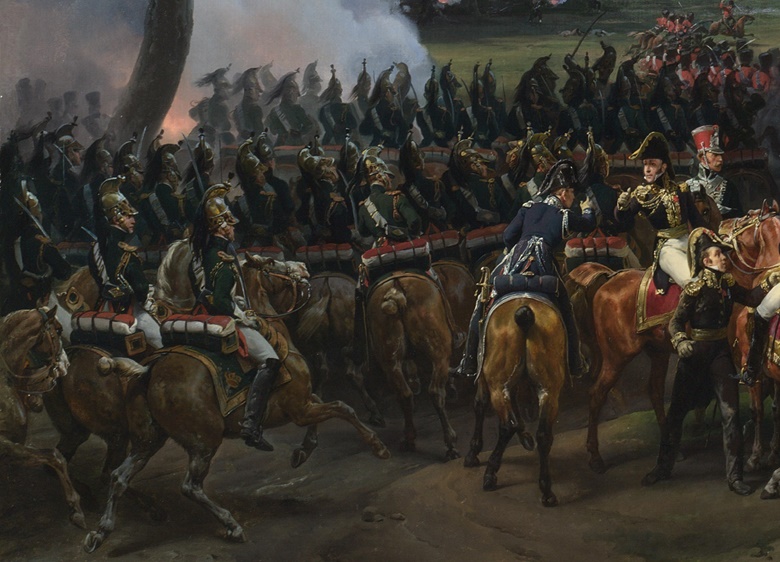The recipient of this letter is most likely Marshal Berthier, the major général of the Grande Armée, or Bessières, who commanded the Guard cavalry.
Elbing, 28 December 1812.
Monseigneur,
In accordance with Your Excellency’s order, I have the honour of presenting you the account of the regiment from the time of its departure from Paris to the present day. I believe it to be as accurate as possible, being convinced that some of the officers, non-commissioned officers and dragoons, who are still missing, will return.
On 3 March, the first detachment of the regiment left Paris under the command of Colonel Major Letort, composed of 33 officers and 463 non-commissioned officers and mounted dragoons. Since then, the corps has been reinforced by Captain Pictet’s detachment from Hanover, composed of 4 officers and 100 non-commissioned officers and mounted dragoons. On 26 July, Major Marthod joined behind Vitebsk with a detachment of 23 officers and 385 mounted non-commissioned officers and dragoons.
Finally, on 3 September, Captain Chamorin arrived at Gjat with 4 officers and 63 non-commissioned officers and mounted dragoons. The regiment at that time should have been composed of 64 officers, 1,011 non-commissioned officers and dragoons and 1,201 horses, including those of the officers. However, due to the various depots that had been left in Posen, Thorn, Vilna and Gloubokoé, as well as the men in the hospitals, the regiment arrived at Moscow with only 64 officers and 890 non-commissioned officers and dragoons.
On the 22nd of September, the regiment left Moscow to proceed to the château of the Prince of Galitzin on the Mojaisk road, and on the 25th, in a reconnaissance commanded by Major Marthod, this senior officer was taken prisoner after being mortally wounded, had a captain and an adjutant taken prisoner, and there were 98 non-commissioned officers and dragoons killed or captured, along with 101 troop horses.
In a foraging operation conducted on 3 October, being at Moscow, and commanded by Squadron Commander Montigny, the corps lost one officer and five dragoons killed. As a result of the fatigues and long marches which the corps was subjected to, it lost 69 troop horses, and we no longer received word of the men at the Moscow hospitals, amounting to 42, with the result that the regiment departed, at this (same) time, with a strength of 745 men and 715 horses.
At the ‘cosaquade’ (Cossack attack) which took place on 25 October, the regiment lost 10 men killed and amputees, of whom nothing more was heard, as well as nineteen horses. Of the escort which had been left alongside the caissons, which numbered twenty-five men including two officers, the least likely to engage in combat, only two officers and the vaguemestre returned. The others perished of misery or were caught by the enemy in the various attacks in which they captured our caissons.
On 28 December, the regiment is composed, according to the result of a review carried out in accordance with Your Excellency’s orders, of only 59 officers, 130 non-commissioned officers and mounted dragoons and 328 non-commissioned officers and dragoons on foot. This tremendous loss is due to those suffered since 25 October to date: 120 men and 157 horses from Boroff to Smolensk, 90 men and 260 horses up to Orsha, 45 men and 127 horses up to the Berezina and those suffered at Vilna and Kowno.
In the course of this march, the regiment lost its caissons, consequently all the effects which they contained, the accounting papers, a sum of 6,000 to 7,000 francs in cash, the paymaster having only had time to flee and to bring with him the little gold which he had on him. Moreover, the officers lost all their effects and part of their horses, and, without the particular solicitude of Your Excellency, they will experience great difficulties in being able to return to the field.
The regiment was also obliged to leave in Vilna, for lack of means of transport, 7,000 to 8,000 francs worth of horseshoes and nails and 1,000 écus worth of leather meant for repairs to the boots.
The regiment lost, during the course of this campaign, a colonel-major who died of his wounds, a squadron commander who died of illness, an officer who was killed in a forage expedition, an assistant surgeon-major of whom nothing has been heard since, an officer who passed away in the hospital at Elbing and three who have not returned since Vilna and Kowno, plus three others who, having their feet and hands frozen, are absolutely unable to continue their service. I am not mentioning to Your Excellency the men who are ill. The number is so considerable that it is often difficult to find any fit for service.
I would point out to Your Excellency that the clothing, equipment, armament and harnesses are in such a state of disrepair that it is essential to replace them with new material.
The regiment will leave ahead of Elbing, on the road to Preuss-Holland, a detachment composed of four officers and 56 mounted non-commissioned officers and dragoons, and in the town at least twenty non-commissioned officers and dragoons with hospital billets. Thus the regiment will be composed only of crippled horses and men on foot.
I am with respect, to Your Excellency, the most humble and most obedient servant,
B. SAINT-SULPICE.
Source : Revue de cavalerie, Librairie militaire Berger-Levrault et Cie, Paris, 1912, pp. 98-100.

Leave a comment